Sickest NHS patients 'face hours on trolleys'
- Published
- comments
Working in A&E for the NHS: 'Every day is relentless'
Many of the most seriously ill patients are waiting for hours on trolleys and in corridors as the NHS struggles to find them beds, BBC research shows.
Nearly a quarter of patients admitted on to wards during December and January in England faced delays of more than four hours before a bed could be found.
It has created a backlog outside hospitals with patients brought in by ambulance facing long waits too.
Experts warned there was "little in the tank" to cope with the coronavirus.
There is mounting concern that the spread of the virus will lead to a pandemic with mass outbreaks in the UK.
The BBC research - based on analysis of NHS England data - found the delays faced by some of the frailest and sickest patients have risen sharply this winter.
The Royal College of Nursing said the situation was unacceptable and treating patients in this way was undignified and put them at risk.
NHS England said extra money was being invested which would help hospitals recruit staff and cut waiting times.
'I spent six hours on trolley at 93'
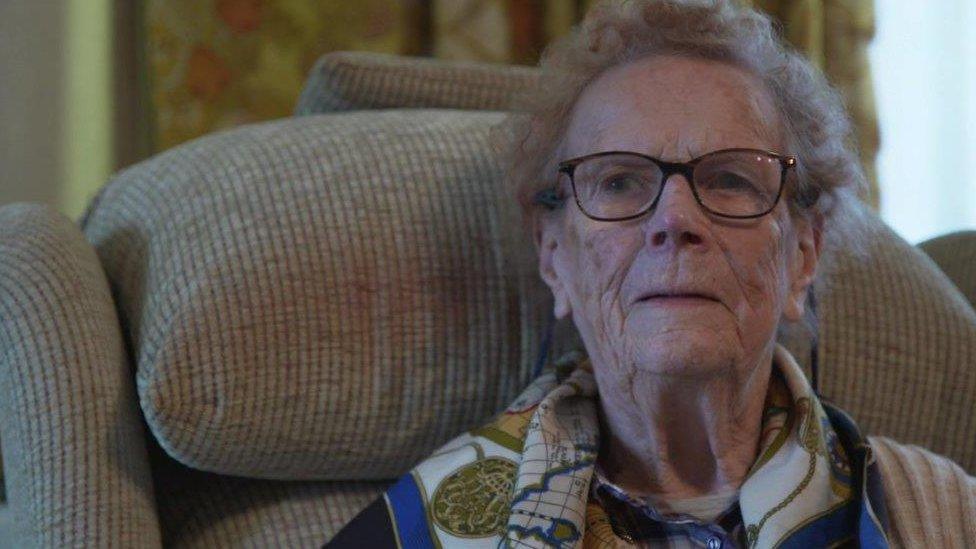
Kate Milsom was taken to hospital after a fall in January
Kate Milsom is one of the many patients who has faced delays.
She is 93 and was taken to London's Hillingdon Hospital in January after falling at home.
The ambulance came quickly, but when she arrived at the hospital there was a long wait to be seen.
She spent more than six hours on a trolley in a corridor - much of the time with the paramedics who had brought her in.
"I was in pain. I had broken my hip before so was really worried.
"The staff were nice... but they were just so busy."
She was eventually found a bed in a bay and was able to go home the following day.
The trust said it could not comment on individual cases but acknowledged the busy nature of the hospital meant some patients faced long waits.
It said staff were working hard to keep these to an "absolute minimum" and all patients were monitored to keep them safe.
What the BBC research has found


It is already widely documented that A&E units have struggled this winter, missing the four-hour target by a record margin.
The new BBC analysis looked at waits in England before and after A&E.
It showed 199,000 patients had four-hour "trolley waits" after being seen in A&E before a bed could be found.
That is more than two times higher than the numbers seen four years ago.
In some hospitals half of patients had waited more than four hours.
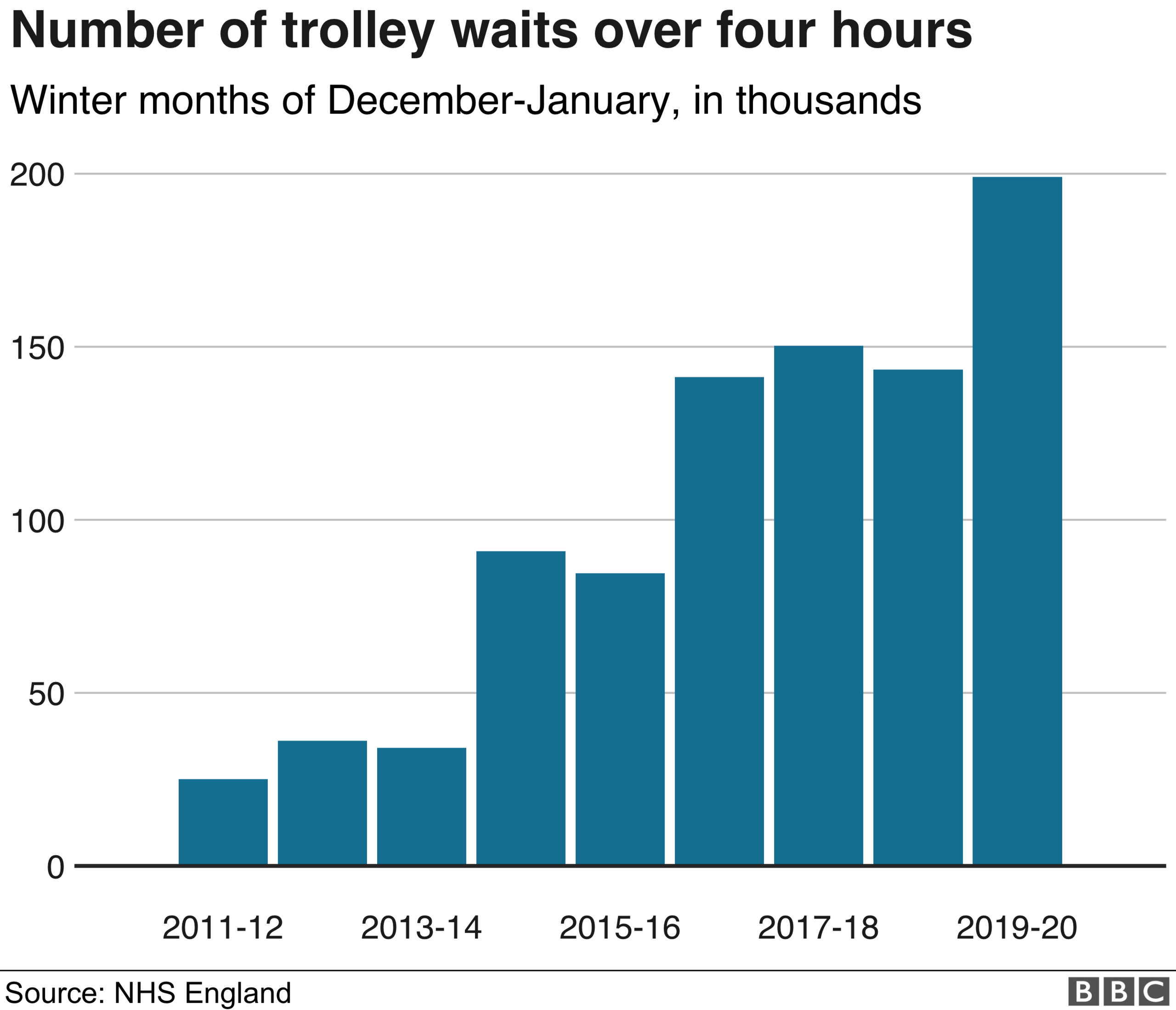
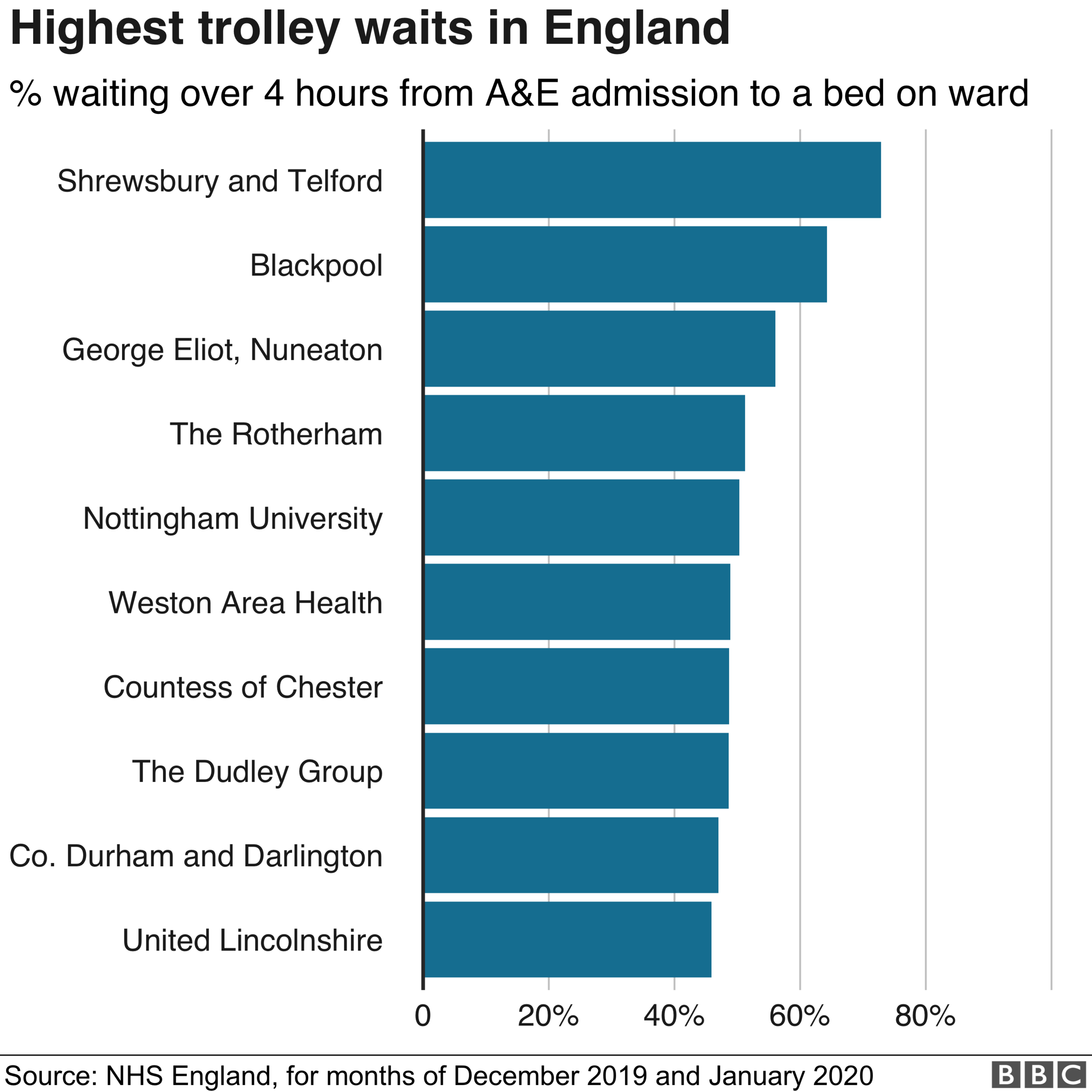
Another 130,000 patients brought in by ambulances were left waiting at least 30 minutes before they could be handed over to hospital staff - one in seven of all those brought in over the two-month period.
Similar pressures are being seen in other parts of the UK, but because of the way figures are collected direct comparisons cannot be made.
The RCN said the situation had got so bad that many hospitals had started deploying nurses to work in corridors, providing treatments such as oxygen and antibiotic drips to patients.
RCN emergency care association chairman David Smith said: "It is not what we want for our patients - it is not dignified and obviously safety is a concern.
"We do our best to make sure they are comfortable and react if they deteriorate. But it is really upsetting for nurses to have to see patients like this."
NHS England medical director Prof Stephen Powis praised the hard work of staff, saying they had "pulled out all the stops" amid rising demand.
He said extra investment would lead to more staff and extra beds which would help in the future.
The implications for a pandemic
The coronavirus outbreak could not have come at a worse time.
The winter has been the most challenging for a generation for the NHS.
The World Health Organization has said governments across the world should prepare for a pandemic - defined as when the virus is being transmitted easily in many countries.
There are signs it is spreading, with significant outbreaks reported in Italy, South Korea and Iran.
There have only been 13 cases in the UK so far - and all were people who had been infected in Asia, meaning there has been no transmission within the UK.
The patients have been treated in the five specialist respiratory centres, but there are plans to use 19 other regional units if needed, with NHS bosses saying there are robust contingency plans in place.
Meanwhile, all hospitals have been asked to set up isolation pods in case patients with the virus go to hospital - the official advice is to phone NHS 111 and self-isolate.
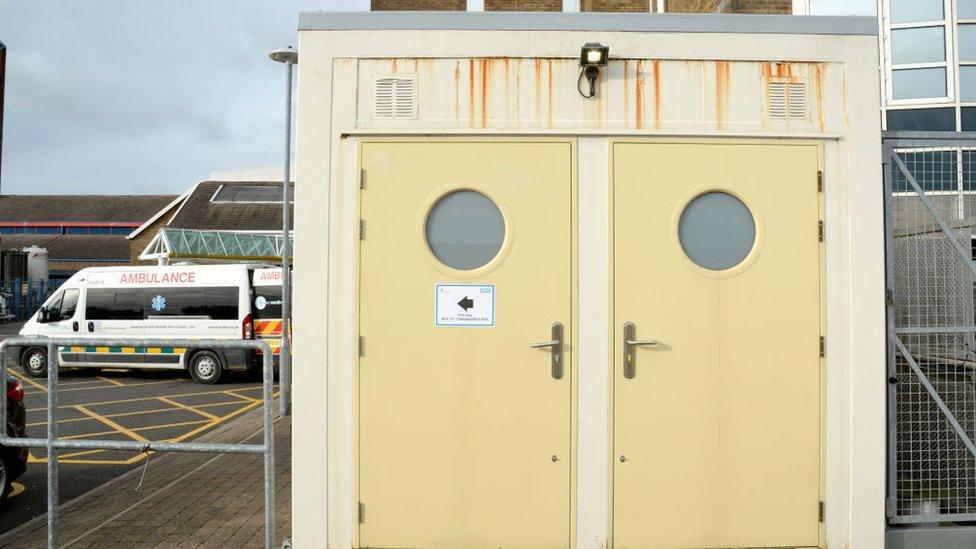
Don't go to A&E - some hospitals have installed special pods to keep potential coronavirus patients away from others
England's chief medical officer Prof Chris Witty said the UK was still working to contain it - and if that did not work the hope was that the spread of the disease could be slowed so cases did not peak in winter.
But Saffron Cordery, of NHS Providers, which represents hospitals, said with services at "full stretch" the additional effort needed to handle a mass outbreak of coronavirus needed extra funding if it was not to "impinge" on day-to-day services.
Helen Buckingham, of the Nuffield Trust think tank, said the swine flu pandemic from 10 years ago showed the NHS was good at dealing with unexpected new illnesses.
But she added it was clear there was "very little fuel in the tank" when it came to staff numbers and hospital beds.
Data analysis by Ben Butcher and Wesley Stephenson
- Published14 November 2019
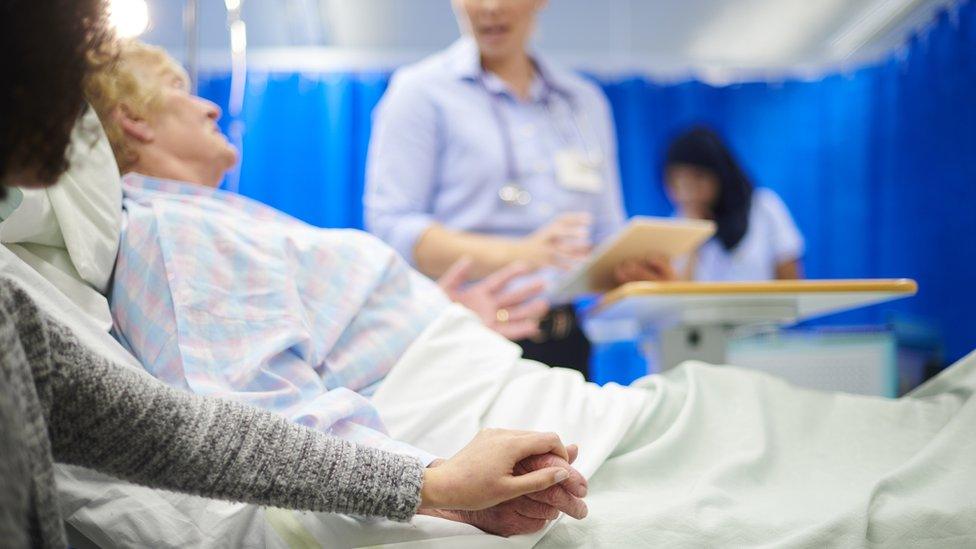
- Published11 September 2018
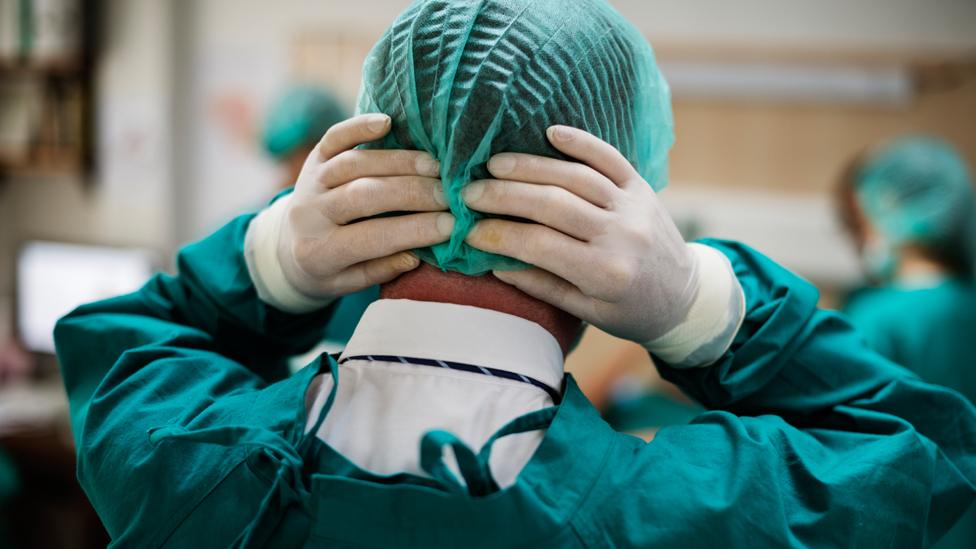
- Published4 January 2018
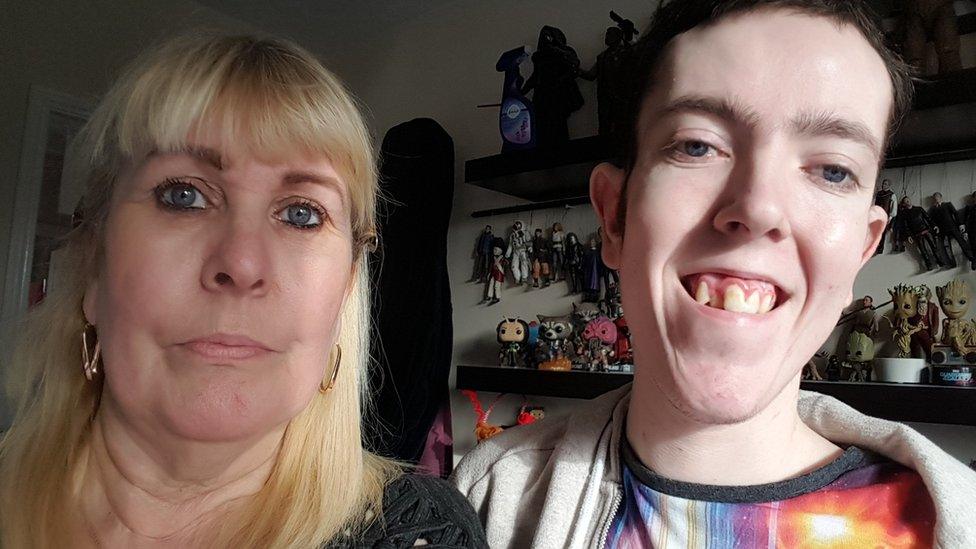
- Published26 December 2017
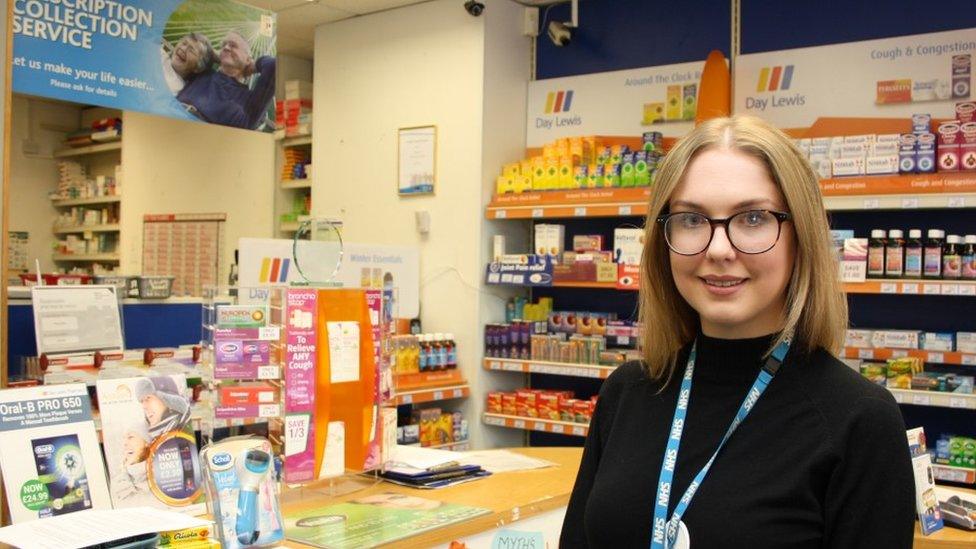
- Published21 December 2017
